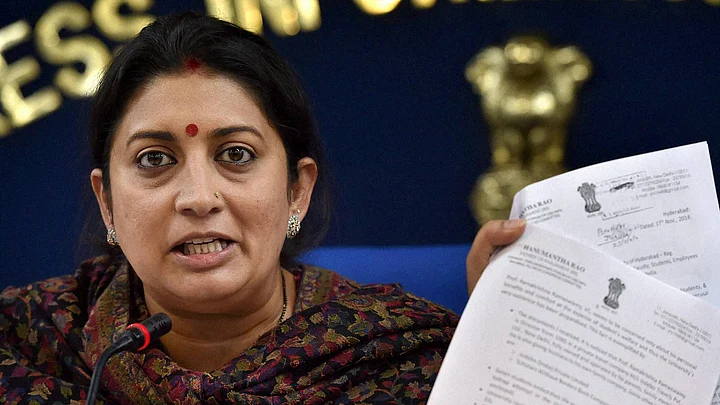A group of over 100 journalists and other professionals related to online media on Tuesday, 1 May, wrote to Information & Broadcasting Minister Smriti Irani to express their concerns over the ministry’s proposal to extend traditional broadcasting rules and restrictions to the internet.
The journalists include both veterans of the industry like Raghav Bahl, MK Venu, Madhu Trehan, Nalini Singh, Paranjoy Guha Thakurta, Shivam Vij, Sanjay Pugalia, Aniruddha Bahal and Raman Kirpal, as well as younger generation media entrepreneurs like Dhanya Rajendran (The News Minute), Seema Mustafa (The Citizen), Ritu Kapur (The Quint), Tanmay Bhat (All India Bakchod) and Bharat Nayak (The Logical Indian).
In their letter (available at https://bit.ly/2HF5UFF), the journalists and media professionals expressed concerns that bringing legacy media structures, such as licensing and content regulation, could have a drastic impact on a medium that is widely credited with making the media and information landscape more open and democratic across the world.
“Internet based media, by its very nature, promotes broader democratic values globally and cannot be dealt with in the way national governments try to regulate or control traditional media,” said MK Venu, Founding Editor at The Wire, a new-generation, online-only publication.
Internet based media, and global media aggregators like Facebook, Google have changed the content and distribution landscape in ways that national governments cannot easily control. Nor should they try to. It is a free democratic space and must remain as such.MK Venu
Geeta Seshu, a journalist and a media analyst with a keen interest in freedom of expression issues, too, called on the government to embrace the change the spirit of freedom brought about by the Internet in media and communication sectors.
“Today, digital media in India is evolving into a space which allows for access to information, untrammelled by traditional gatekeeping structures and despite infrastructural limitations like low broadband speeds or poor internet penetration,” she said.
She expressed disappointment at the government’s attempt to ‘regulate’ online media by setting up a committee comprising mostly of government officials.
“This committee hardly reflects the complexities of online media, much less represent all its practitioners,” she said. “Its mandate to regulate the dissemination of information smacks of the most alarming attempts to censor a burgeoning medium. It is ironic that one of the terms of this committee is to examine international standards when India is hailed for taking a strong and unequivocal stand on net neutrality. We can, and should, be leading the way in upholding the tenets of a free, plural, democratic and egalitarian media space,” she added.
Journalist Madhu Trehan, the co-founder of NewsLaundry, one of the earliest digital news ventures, warned about the far-reaching impact that interfering with the citizens’ freedom of expression, online or offline, can have.
“Regulating the Internet is a tricky thing. It’s impact is enormous and far reaching,” said Trehan. “The proposal to regulate (and its need at all) must be a consultative process in the most open and transparent way.”
“The Internet is the most important invention since the printing press, with a bigger impact than the press. To regulate the printing press would mean strangling thousands and millions of books down the ages that have transformed the world. That is the impact we are looking at. The Internet is the printing press of the digital age. A proposal for its regulation must be debated threadbare before any action,” she added.
Seema Mustafa, founder editor of The Citizen, a news and current affairs website, warned that chances of ‘online content regulation’ being used for suppression of opinions critical of the government remain very high.
“The attempt to control the internet comes from classic insecurity associated with governments fearful of dissent,” she said.
“The essentially bureaucratic composition of the committee set up by GOI is an indication of the direction the so called regulation mechanism can be expected to take. Peoples all over the world have opposed and stopped such attempts by governments to control space that has become increasingly valuable for individuals and increasingly for independent media,” she added.
Raghav Bahl, founder of Network18 and Quintillion Media, urged the government to look at the approach taken by other democracies in dealing with issues of online content.
“Any hasty action by the government will likely result in overreach,” he said.
“Therefore, we believe that the starting point for the government should be to study the global best practices for online content regulation. Many advanced democracies have already debated this and come up with good frameworks that ensure free speech and transparent regulation. No need to reinvent the wheel,” he added.
The journalists organised themselves using social media, particularly WhatsApp, spontaneously after news broke that the government had set up a committee to come up with a regulatory structure for online media “on the lines applicable to print and electronic media”.
Over 100 journalists and professionals, including those from dozens of online organisations, signed the petition.
A website, onlinefreedomfoundation.org, has also been set up to allow ordinary citizens to oppose the move to regulate online content.
